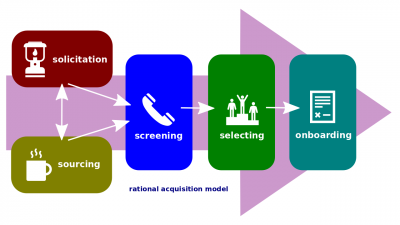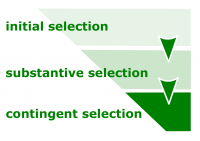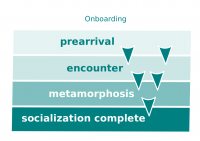Difference between revisions of "Book of Recruitment"
(→Recruitment (overview)) |
(→Statement of recruitment needs) |
||
| Line 15: | Line 15: | ||
:*'''[[Job description]]'''. A written statement that describes a job.</div> | :*'''[[Job description]]'''. A written statement that describes a job.</div> | ||
| − | :'''[[KSA]]''' (or [[knowledge, skills, and abilities]]). A series of narrative statements that are particularly required when applying to United States | + | :'''[[KSA]]''' (or [[knowledge, skills, and abilities]]). A series of narrative statements that are particularly required when applying to [[United States Government]] job openings. [[KSA]]s are used to determine, along with [[résumé]]s, who the best applicants are when several candidates qualify for a job.<div style="background-color:#efefef; padding: 5px; margin: 15px;"> |
| − | :*'''[[Work-related knowledge]]'''. | + | :*'''[[Work-related knowledge]]'''. A body of [[knowledge]] applied directly to a particular [[occupation]] and/or [[industry]]. |
| − | :*'''[[Work-related skill]]'''. | + | :*'''[[Work-related skill]]'''. A set of skills applied directly to a particular [[occupation]] and/or [[industry]]. |
| − | :*'''[[Work-related ability]]'''.</div> | + | :*'''[[Work-related ability]]'''. A set of capacities applied directly to a particular [[occupation]] and/or [[industry]].</div> |
===Screening of employment candidates=== | ===Screening of employment candidates=== | ||
Revision as of 15:30, 15 January 2019
Introduction to Recruitment (hereinafter, the Lecture) is a lecture introducing the learners to recruitment and related topics. The Lecture is the third of eight lectures of WorldOpp Orientation (hereinafter, the Orientation).
Contents
Outline
Introduction to Employment is the predecessor lecture.
Recruitment (overview)
- Recruitment. The process of filling job vacancies with people.
- Sourcing. Enterprise efforts undertaken in order to identify and list possible sources, internal and/or external, that are potentially capable to provide the specified organizational resources, as well as potential data sources who are able to provide relevant information on specific procurement.
- Source selection. The process of selected sources whose resources, credibility and performance is expected to meet the contract/procurement objectives within a competitive range of cost.
- Onboarding. The mechanism of integrating a new employee into the enterprise and its culture.
Statement of recruitment needs
- Job analysis. An assessment that defines jobs and the behaviors necessary to perform them.
- Job description. A written statement that describes a job.
- KSA (or knowledge, skills, and abilities). A series of narrative statements that are particularly required when applying to United States Government job openings. KSAs are used to determine, along with résumés, who the best applicants are when several candidates qualify for a job.
- Work-related knowledge. A body of knowledge applied directly to a particular occupation and/or industry.
- Work-related skill. A set of skills applied directly to a particular occupation and/or industry.
- Work-related ability. A set of capacities applied directly to a particular occupation and/or industry.
Screening of employment candidates
- Source screening. (1) The evaluation or investigation of a source as part of a methodical survey, to assess suitability for a particular role or purpose; (2) Techniques used for source consideration, reviewing, analyzing, ranking, and selecting the best alternatives for the proposed action.
- Job interview (more narrowly, employment interview). An interview consisting of a conversation between a job applicant and one or more representatives of an employer which is conducted to assess whether the applicant should be hired and, possibly, negotiate conditions of this hiring.
Services of recruiters
- Recruitment service. Any service related to recruitment.
- Retained recruiter. A recruiter who is paid for the time spent while recruiting regardless of the fact whether qualified sources are identified, hired, or not.
- Contingency recruiter. A recruiter who is paid only when qualified sources are identified and hired.
- Outsourced recruitment. The whole recruitment or its part that is outsourced to another legal entity, either an individual or an organization.
- Employment agency. Any entity that matches employers and employment candidates.
- Staffing firm. Any entity that provides employers with their staffers.
- Temporary staffing provider. Any entity that provides employers with temporary staffers.
- Headhunter (executive search provider or headhunting provider). A specialized recruitment service designed to provide employers with highly qualified employment candidates especially for senior-level and executive jobs.
Introduction to Career Administration is the successor lecture.
Materials
Recorded audio
Recorded video
Live sessions
Texts and graphics
Quiz questions
- Sample true/false questions:
- Recruitment is (not) the process of filling job vacancies with people.
- Recruitment includes (or does not include) sourcing.
- Recruitment includes (or does not include) source screening.
- Recruitment includes (or does not include) source selection.
- Recruitment is (not) the process of finding available and qualified candidates to fill in job vacancies.
- Sourcing is (not) the process of filling job vacancies with people.
- Sourcing is (not) the process of finding available and qualified candidates to fill in job vacancies.
- Source selection is (not) the process of finding available and qualified candidates to fill in job vacancies.
- Source screening is (not) the process of finding available and qualified candidates to fill in job vacancies.
- Source selection is (not) the process of filling job vacancies with people.
- Recruitment is (not) the process of selecting those candidates who offer the best solutions to the organization's needs.
- Sourcing is (not) the process of selecting those candidates who offer the best solutions to the organization's needs.
- Source selection is (not) the process of selecting those candidates who offer the best solutions to the organization's needs.
- Source screening is (not) the process of selecting those candidates who offer the best solutions to the organization's needs.
- Source screening is (not) the process of filling job vacancies with people.
- Recruitment is (not) investigation undertaken in order to find and evaluate the data relevant to credentials of employment candidates.
- Sourcing is (not) investigation undertaken in order to find and evaluate the data relevant to credentials of employment candidates.
- Source selection is (not) investigation undertaken in order to find and evaluate the data relevant to credentials of employment candidates.
- Source screening is (not) investigation undertaken in order to find and evaluate the data relevant to credentials of employment candidates.
- Job interview is (not) a conversation and, possibly, negotiation between an employment candidate and one or more employer representatives.
- Job interview is (not) a part of sourcing.
- Job interview is (not) a part of source screening.
- Job interview is (not) a part of source selection.
- Job analysis is (not) an assessment that defines jobs and the behaviors necessary to perform them.
- Job description is (not) an assessment that defines jobs and the behaviors necessary to perform them.
- Job analysis is (not) a written statement that describes a job.
- Job description is (not) a written statement that describes a job.
- KSA stands (or does not stand) for knowledge, skills, and abilities.
- KSA is (not) a series of narrative statements that describe competencies that the employer is looking for.
- Work-related knowledge is (not) a part of KSA.
- Work-related skills are (not) a part of KSA.
- Work-related abilities are (not) a part of KSA.
- Work-related knowledge is (not) a familiarity, awareness, or understanding of someone or something needed for a particular job.
- Work-related knowledge is (not) the learned ability to carry out a task with pre-determined results relevant to a particular job.
- Work-related knowledge is (not) the capability to perform some function or functions and achieve certain outcomes important to a particular job.
- Work-related skill is (not) a familiarity, awareness, or understanding of someone or something needed for a particular job.
- Work-related skill is (not) the learned ability to carry out a task with pre-determined results relevant to a particular job.
- Work-related skill is (not) the capability to perform some function or functions and achieve certain outcomes important to a particular job.
- Work-related ability is (not) a familiarity, awareness, or understanding of someone or something needed for a particular job.
- Work-related ability is (not) the learned ability to carry out a task with pre-determined results relevant to a particular job.
- Work-related ability is (not) the capability to perform some function or functions and achieve certain outcomes important to a particular job.
- Recruitment service is (not) any service related to recruitment.
- Employment agency is (not) any entity that matches employers and employment candidates.
- Staffing firm is (not) any entity that provides employers with their staffers.
- (Not) every recruiter is an employee of the employer who is hiring.
- (Not) every recruiter is paid for the candidates that he or she sourced, screened, and selected.
- Retained recruiter is (not) paid for the time spent while recruiting.
- Retained recruiter is (not) paid only when qualified sources are identified and hired.
- Contingency recruiter is (not) paid for the time spent while recruiting.
- Contingency recruiter is (not) paid only when qualified sources are identified and hired.


